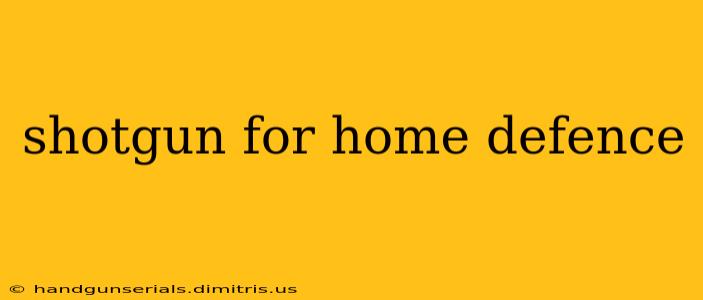Choosing a shotgun for home defense is a serious decision, demanding careful consideration of various factors beyond simply picking the most powerful option. This guide will delve into the key aspects to help you make an informed choice that prioritizes safety and effectiveness. We'll explore different shotgun types, ammunition considerations, legal implications, and training necessities. Remember, responsible gun ownership is paramount.
Types of Shotguns for Home Defense
Several shotgun types are suitable for home defense, each with its own advantages and disadvantages:
1. Pump-Action Shotguns:
- Pros: Reliable, relatively inexpensive, and offer a high capacity. The manual action allows for a tactile confirmation of each round being chambered.
- Cons: Slower to reload compared to semi-automatic options, and can be more difficult to operate under stress.
2. Semi-Automatic Shotguns:
- Pros: Faster follow-up shots, higher capacity than pump-actions. Less felt recoil in some models.
- Cons: Can be more expensive, potentially more prone to malfunctions (though modern designs have greatly improved reliability), and require more maintenance. The lack of a tactile confirmation for each round can be a drawback in high-stress situations.
3. Tactical Shotguns:
These often incorporate features specifically designed for defensive purposes, such as shorter barrels, pistol grips, and tactical rails for accessories. While highly effective, they are generally more expensive.
4. Break-Action Shotguns:
While not ideal for rapid fire, these shotguns are extremely reliable. They're generally simpler to maintain and more affordable than other options. However, they are not practical for high-stress home defense scenarios due to their slow reloading speed.
Ammunition Selection: Critical Considerations
Choosing the right ammunition is as important as choosing the right shotgun. Common choices include:
-
Buckshot: Larger pellets, effective at close range, offering substantial stopping power. The trade-off is limited range and potential for overpenetration.
-
Birdshot: Smaller pellets, less stopping power, greater range, but significantly reduced likelihood of overpenetration, making it safer in densely populated areas. Generally not recommended for home defense.
-
00 Buckshot: A popular choice for home defense, offering a balance between stopping power and manageable recoil.
Overpenetration is a significant concern. The type of wall and its construction plays a critical role in determining whether a round will penetrate it. This must be factored into your ammunition choice. Consult with firearms experts to ensure your choices are appropriate for your home's structure.
Legal and Regulatory Aspects
Gun laws vary significantly by location. It's crucial to understand and comply with all federal, state, and local regulations regarding shotgun ownership, storage, and use for self-defense. Failure to do so can lead to serious legal consequences. Familiarize yourself with the laws in your jurisdiction before purchasing any firearm.
Training: Absolutely Essential
Owning a shotgun for home defense is not enough. You must receive proper training. This includes:
- Safe gun handling: Basic safety rules are non-negotiable.
- Proper shooting techniques: Accuracy and controlled firing are vital under stress.
- Home defense tactics: Understanding strategic positioning and tactical considerations is essential.
Consider taking a professional home defense course taught by certified instructors. This training is an investment in your safety and the safety of your loved ones.
Conclusion
Choosing a shotgun for home defense requires careful planning, consideration, and training. The best option depends on your individual circumstances, home layout, and local regulations. Remember that responsible gun ownership includes understanding the legal ramifications, practicing safe handling techniques, and receiving professional training. Prioritize safety above all else. This information is for educational purposes only and does not constitute legal or professional advice. Consult with relevant experts for personalized guidance.

